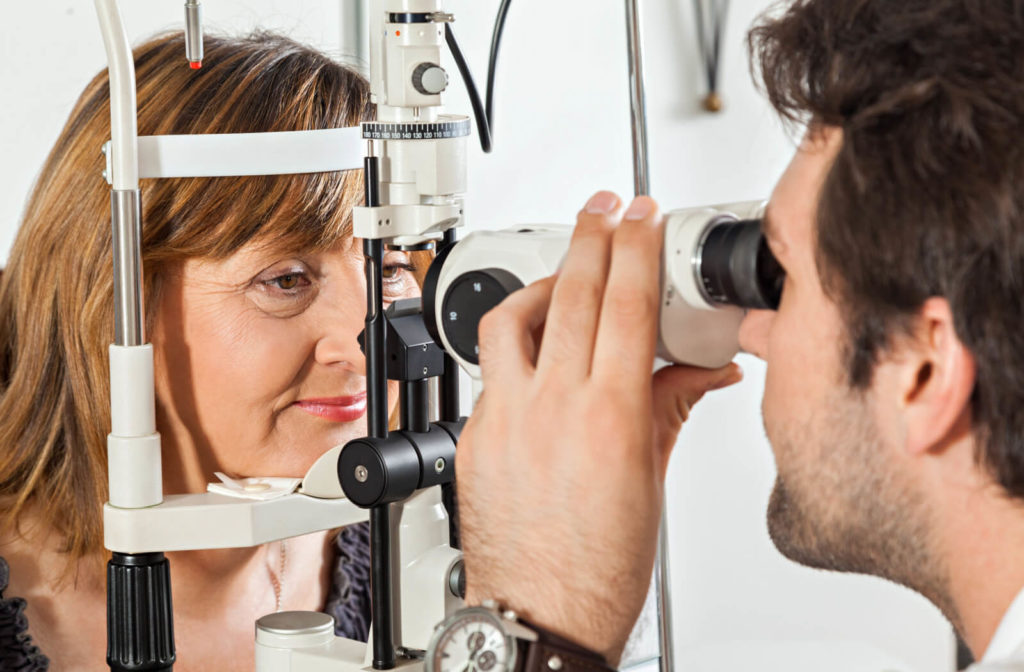Routine eye exams are an essential part of maintaining good overall health. In addition to screening for vision problems and refractive errors, an eye exam can also help uncover signs of various health conditions.
In fact, some diseases can be detected during an eye exam before any other symptoms are present. An eye exam can play an important role in helping detect a wide range of eye and general health diseases, including diabetes, high blood pressure, glaucoma, and macular degeneration.
Many health conditions are most treatable in their earliest stages. Staying up-to-date with your eye doctor can play a key role in the early detection and diagnosis of a wide range of health conditions.
How Can an Eye Exam Help Detect Diseases?
A full comprehensive eye exam involves much more than just a vision test. During an eye exam, your optometrist can examine the important structures of your eye, such as your retina, blood vessels, and optic nerve. These structures can provide important insights into your overall health and indicate the presence of certain diseases.
An eye exam involves an array of tests to observe changes to both your vision and ocular health. If your eye doctor notices any abnormalities during these tests, it may be a sign of a serious health condition that requires additional testing to diagnose.
How Often Do I Need an Eye Exam?
It is a common misconception that you only need an eye exam when you are experiencing vision changes. A regular eye exam can provide valuable insight into your vision and overall health.
While the American Optometric Association recommends an eye exam schedule based on your age range, you should consult your eye doctor to determine an exam schedule that takes your unique visual and health needs into account.
For most individuals, if you have not had an eye exam in the past year or two, it is important to schedule one with your eye doctor to check on the health of your eyes and your overall well-being.
What Diseases Can Be Detected During an Eye Exam?
They say that “the eyes are the window to the soul,” but your eyes may also be the window to detecting some serious health problems. Your vision and ocular health can be closely tied to many health conditions.
Some of the most common diseases that can be detected during an eye exam include:
Autoimmune Diseases
Autoimmune diseases such as lupus, rheumatoid arthritis, multiple sclerosis, and Sjogren’s syndrome can affect your eyes and vision.
During an eye exam, your eye doctor may observe changes to the blood vessels in your retina, inflammation, or damage to your optic nerve, all of which may indicate the presence of an autoimmune disease.
Diabetes
Diabetes is a chronic disease that affects how your body processes glucose, leading to high blood sugar levels. Uncontrolled diabetes can lead to complications such as nerve damage, kidney disease, and even blindness.
During an eye exam, your optometrist may observe changes to the blood vessels in your retina, such as swelling or leaking, which can be a sign of diabetes. This condition, called diabetic retinopathy, can cause permanent vision loss. However, early detection and proper treatment can prevent further damage and help to preserve vision.
Individuals with diabetes are also at an increased risk of developing other health problems and may require yearly diabetic eye exams to properly monitor their overall health.
Glaucoma
Glaucoma is an eye disease that causes damage to your optic nerve, leading to vision loss and blindness. Glaucoma often presents no symptoms in its early stages, making regular eye exams essential for early detection and treatment.
During an eye exam, your optometrist may perform a tonometry test, which will measure the pressure inside your eye and may help to detect glaucoma.
High Blood Pressure
High blood pressure, or hypertension, can cause damage to the blood vessels in your eyes, leading to vision problems and even blindness.
During an eye exam, your eye doctor can observe changes to the blood vessels in the retina, such as narrowing, thickening, or kinking. These changes can be a sign of high blood pressure and indicate the need for further medical evaluation and treatment.
Having high blood pressure may also put you at an increased risk of developing glaucoma.
Macular Degeneration
Age-related macular degeneration is a progressive eye disease that affects your macula, the central part of your retina that is responsible for sharp, central vision. This is a serious eye disease that can cause permanent vision loss and even blindness. Similarly to glaucoma, macular degeneration often presents no symptoms and can only be detected through an eye exam during its earliest stages.
During an eye exam, your optometrist will observe changes to your retina or macula, such as the presence of drusen, small yellow deposits under the retina, which can indicate macular degeneration.
Early detection and treatment are crucial to preventing macular degeneration from progressing and causing permanent vision loss.
What Other Diseases Can Be Detected in an Eye Exam?
We have outlined five common diseases that can be detected in an eye exam above, but this is by no means an exhaustive list.
Some additional diseases that can be detected in an eye exam include:
- Cancer—especially brain, blood, tissue, or skin cancers
- Heart disease
- Lyme disease
- Sarcoidosis
- Sexually transmitted diseases, including; syphilis, herpes, chlamydia, HIV, and gonorrhea
- Sickle cell disease
- Thyroid disease
- Vascular disease
Time to Book an Eye Exam
Regular eye exams are not only important for detecting vision problems, but they can also uncover signs of various health conditions and diseases. If you have not had an eye exam in the past year, it is important to schedule one with your optometrist.
At The Eye Gallery, we provide comprehensive eye exams that include tests to help detect potential health problems. Contact our office to schedule an eye exam and take control of your health today!




